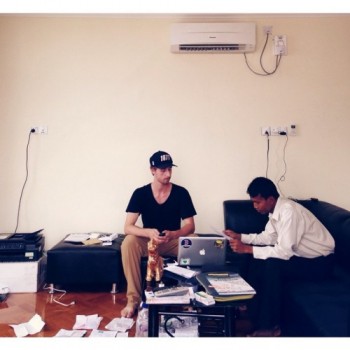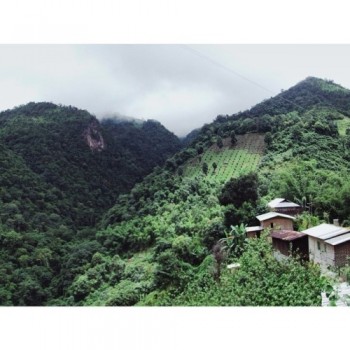 Lessons learned from six-months in Myanmar
Lessons learned from six-months in Myanmar
by John Erland
A week removed from campus life, I had arrived for my first day of work. Dawn broke over a clear sky and across the valley floor, as light spilled into the Shan Highlands, illuminating rice paddies and patchwork fields woven into hillsides speckled with thatched roofs. The jalopy-style coach I boarded a day before had finally completed a tumultuous ascent into the heart of Shan state. The state, a spectacular mountainous province in central Myanmar, is neglected by the central government, plagued by conflict, and home to the country’s largest minority, the Shan people.
It is undeniable that millennials like myself are seeking experiences like this now more than ever. Experiences that foster independence, that encourage wanderlust and are immersive in communities and cultures very different than the ones from which we came. Whether this is a phenomena representative of only our cohort, or of a permanent shift in how young people shape their aspirations, this attitude meshes almost seamlessly with the ethos of social entrepreneurship.
With that in mind, when I was invited to submit an article for the SEI newsletter about my time in Myanmar I decided the most useful topic I could discuss was the lessons I learned from the challenge of working in a developing country as an unproven student.
But, before jumping into these lessons, here is a little bit about the country and the context in which I learned them:
Myanmar is an immensely and impossibly beautiful country stretching from the Bay of Bengal to the Himalayas, protected by mountainous borders insulating itself from its neighbors — Bangladesh and India in the West; China, Laos and Thailand in the East.
Marred by political turmoil and made infamous by the human rights abuses committed by a largely still intact socialist military regime, Myanmar is also an impossibly complex country. After decades of being exiled from the international community, Myanmar’s government introduced a series of reforms in 2010 (most of which have fallen short of their promises) aimed at democratization, economic opportunity and rehabilitation of its reputation.
Nevertheless, Myanmar is opening itself to the world, making the resource-rich country one of the most attractive emerging markets, and a new frontier for NGOs and social enterprises to establish programs and advocate for policy change. Despite contending with a government that doesn’t necessarily make it easy for them to operate, NGOs and social enterprises are addressing serious issues like the country’s poverty, which rivals Afghanistan’s, the endless armed conflict between ethnic groups and the government fueled by the jade trade and the opium market, and the restoration of political and economic freedom, stubbornly held back by the country’s old guard.
I went to Myanmar to work for Partnership for Change (PFC), a Norwegian-based NGO, with a social innovation fund that invests in education, vocational training programs and enterprise development. For what would be nearly six months, I traveled around Myanmar working on various PFC projects that ranged from tourism development to the rehabilitation of political prisoners. I can confidently say that for a lot of the time I didn’t know what I was doing, and I frequently made mistakes. But, I learned lessons from them and I hope other students with similar aspirations to mine can appreciate the importance of overcoming challenges.
Lesson 1: Your team is like your family
My team was a motley crew: a Burmese student who hadn’t graduated high school yet; our director, a formerly retired telecom executive; a recent graduate from Yale who had an almost manic work ethic; a former monk who left his order because he fell in love; and a young Norwegian stationed in rural Shan state who led a host of very outspoken young Burmese women set on becoming English teachers.
We frequently traveled together and a combination of us would always live under the same roof. We ate almost all of our meals together and it was seldom we would spend much time apart. And of course, we also had to work together! This arrangement could cause some friction. But that’s the crux of working in development within a developing country; your team is more like your family than the people you see at the office everyday before returning home.
Our team, or should I say family, would joke that our director had adopted all of us, because that’s how different we were from each other. From others I have spoken to, the variance in team members arose from a challenge to find appropriate skills in an environment previously devastated by a breakdown in the school system. I imagine that these conditions are likely present in other developing communities worldwide and result in similar working conditions. Helping your “family” stick together means being different, together. Recognizing your peers cultural differences, and learning to enjoy them. Forgiving each other before someone feels the need to apologize, because everyone’s making mistakes. Confiding in one another to strengthen your friendships, because the stronger your relationships are, the easier it will be to overcome adversity experienced on the job.
Lesson 2: There is no such thing as business as usual
In the West, we have a predisposition to having control over our circumstances, as things are usually “business as usual.” But, when removed from this environment, control is hard to maintain, and if you try to, it will inevitably cause a degree of anxiety.
This means being willing to front organizational costs out of pocket when cash on hand runs dry because it is too difficult to set up local bank accounts and move money through the country. It means being without email for days on end because the power grids are down and the Internet is, well, sometimes non-existent. It means expecting miscommunications that could lead to costly errors because language is a serious barrier. It means finding a new way to film an environmental awareness project because the film crew was arrested at the border for their aerial drone. It means assessing the needs of the vulnerable former political prisoner community behind closed doors to avoid suspicions.
And what it really means is finding solid ground in a work environment that can be dictated by forces outside of your control, like how you treat the people on your team day in and day out, how effectively you communicate about the challenges of whatever project you’re working on, and whether you push yourself to rise to the occasion even when you are exhausted and overwhelmed.
Lesson 3: Embrace loneliness, foster independence
“I can’t lie, this is not an easy experience. But I didn’t sign up for this without that expectation. There are many days when nothing really goes right, and I’m like, plane ticket home, lets go.”
This is what I wrote my friend in October, with about two months left in Myanmar. I had moved to Yangon, the former capital city, and in the words of my boss, I was “in a very difficult situation: teaching English to former political prisoners and managing our office in a very large and chaotic city with no on-site support or supervision.” The romance that I had associated with my experience had worn off and so had my initial vigor working for PFC. I felt confined to myself, alone in my experience in a country almost devoid of familiarity. And this was my choice!
Millennials, in particular, have difficulty being alone, as professed by our attachment to social media. So, those going to work in developing countries should brace themselves for the enchantment with the experience to dissipate, and be ready to embrace the hard-wrought reality of overcoming the challenges of the job seemingly on their own. It is important to find your stride in the loneliness of being lost in translation, doing difficult work, because the work being done in developing countries is critical, and young people especially now, have the ambition, opportunities, time and energy to take it on.




